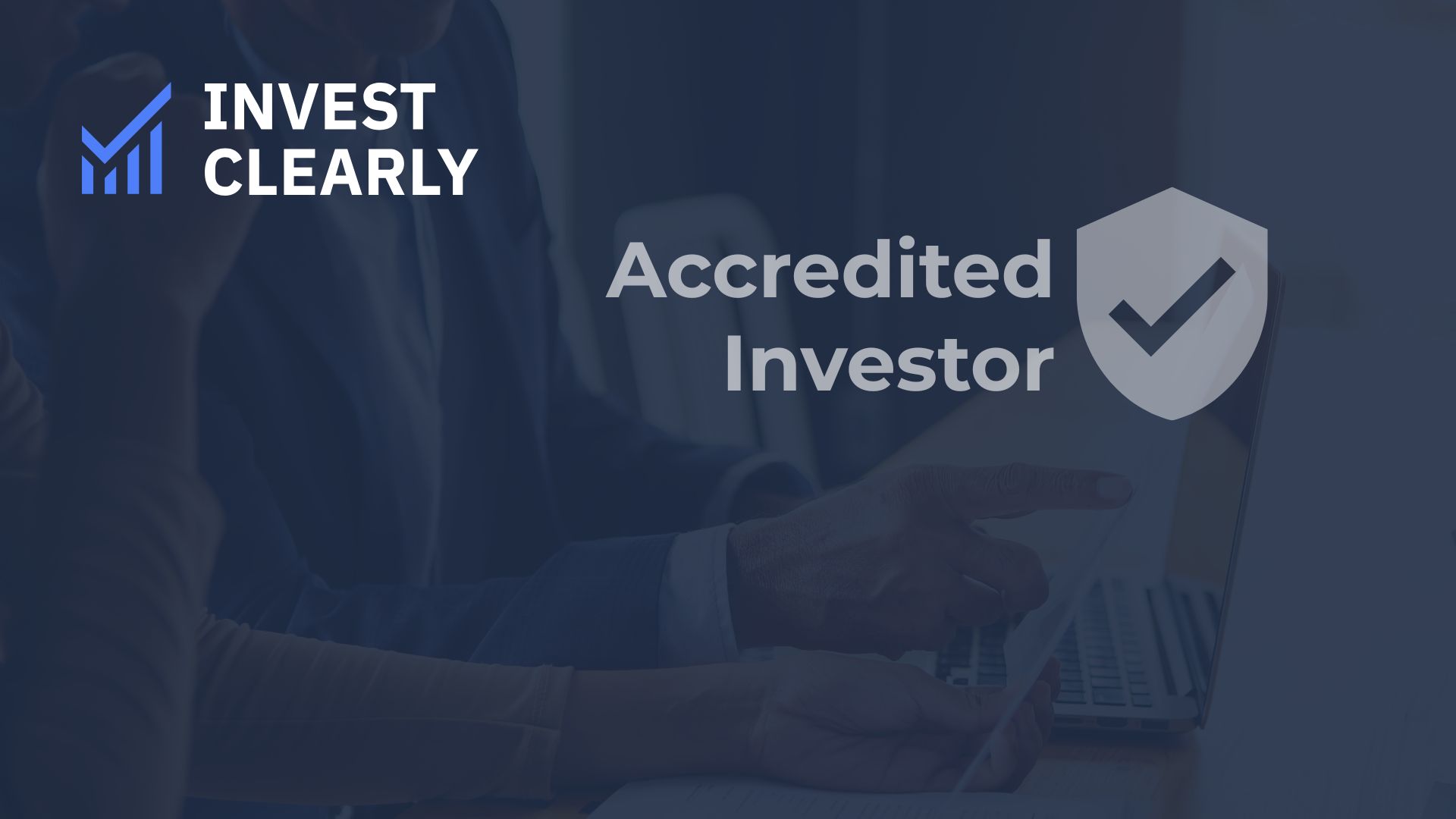
Never miss an Invest Clearly Insights article
Subscribe to our newsletter today
Private real estate syndications, real estate private equity funds, hedge funds, and other exclusive investment opportunities often come with a gatekeeper: accredited investor status. If you’ve ever wondered why certain deals are “invite-only” or why some platforms advertise offerings only for “accredited investors,” the answer lies in U.S. securities law.
At its core, the concept exists to distinguish investors who have the financial means or sophistication to participate in higher-risk, less-regulated investments. Accredited investors gain access to private placements under SEC Regulation D, including real estate syndications and real estate private equity funds that are not open to the general public.
Understanding what is accredited investors, how the federal securities laws and the SEC accredited investors definition works, and what it takes to meet the accredited investors requirements is essential if you want to move beyond traditional stocks and bonds and into private markets. This article breaks down the Rule 501 accredited investor definition, the pathways to qualifying, and what accredited status means for building wealth through real estate.

Accredited Investor Definition Under SEC Rule 501 (and Why It Matters for Real Estate Syndications)
The legal foundation to qualify as an accredited investor comes from Rule 501 of Regulation D under the Securities Act of 1933. This rule provides the official accredited investors definition used by the Securities and Exchange Commission (SEC).
Under Rule 501, an accredited investor is generally:
- An individual with income exceeding $200,000 in each of the two most recent years (or $300,000 with a spouse or spousal equivalent) and a reasonable expectation of the same income in the current year.
- An individual with net worth exceeding $1 million, either alone or with a spouse, excluding the value of their primary residence.
- A professional with certain licenses or certifications, such as Series 7, 65, or 82.
- A director, executive officer, or general partner of the issuer of the securities being offered.
- Certain entities, such as banks, trusts, or funds with at least $5 million in assets, or entities in which all equity owners are accredited.
Why does this matter for real estate syndications and real estate private equity? Most offerings in these spaces are structured under Regulation D exemptions, particularly Rule 506(b) and Rule 506(c). Under 506(c), sponsors can publicly market their offerings, but only to accredited investors. That means if you want access to professionally managed syndications or private equity real estate deals, accredited status is the key that opens the door.
Why Does Accreditation Exist in Syndications and Real Estate Private Equity?
The SEC did not create the concept of accredited investors to arbitrarily exclude people. Instead, it exists as a protective measure and is used to gauge if an individual is sophisticated enough to make smart investment decisions. Private placements, such as real estate syndications and real estate private equity funds, are not registered with the SEC in the same way as public securities are. That means they do not carry the same level of disclosure, regulatory oversight, or investor protections that come with stocks and bonds traded on public exchanges.
Because of this lighter regulation, the SEC assumes that participants in these deals should either:
- Have the financial cushion to absorb potential losses, or
- Possess the knowledge and sophistication to understand the risks.
This rationale is particularly important in real estate investing. Syndications and private equity real estate funds often involve:
- Illiquidity: Your capital may be tied up for years, with no option to sell early.
- Complex structures: Waterfall distributions, preferred returns, and promote structures can be confusing without financial experience.
- Higher risk profiles: Projects can involve leverage, development risk, or market volatility that may not be obvious to new investors.
- Limited information: Unlike public companies, private issuers are not required to provide quarterly SEC filings, leaving investors more reliant on sponsor reporting.
In other words, the accredited investor standard is not just a legal threshold. It’s also a signal that private offerings like syndications and real estate private equity funds carry different risks and responsibilities compared to public market investments.
How to Qualify as an Accredited Investor
For investors interested in private investments, the question is often: How do I become accredited? The answer depends on your financial profile and professional background.
Current SEC Pathways to Accredited Status
Right now, there are four main ways to qualify as an SEC accredited investor under Rule 501 of Regulation D:
- Income Test
- Requirement: Earn an annual income of more than $200,000 as an individual (or $300,000 joint income with a spouse or spousal equivalent) for the last two years, with a reasonable expectation of the same in the current year.
- Proof: Tax returns, W-2 forms, or recent pay stubs covering the relevant years.
- Net Worth Test
- Requirement: Hold a net worth of $1 million or more, either individually or jointly with a spouse or spousal equivalent, excluding the value of a person's primary residence.
- Proof: Recent bank statements, brokerage or retirement account statements, appraisals of other assets, and credit reports showing outstanding liabilities.
- Professional Credentials
- Requirement: Hold certain securities licenses, such as the Series 7, 65, or 82, which the SEC recognizes as indicators of financial sophistication.
- Proof: A copy of your FINRA record or documentation showing your license status in good standing.
- Issuer Role
- Requirement: Serve as a director, executive officer, or general partner of the company issuing the securities.
- Proof: Corporate documentation confirming your role or position with the issuer.
Entities (LLCs or Trusts) can also qualify to invest in a private fund if they have $5 million or more in assets, or if all equity owners are accredited investors.
Verification Process
In 506(b) offerings, sponsors typically rely on investor self-certification forms. However, because these offerings allow a small number of non-accredited investors, they are not allowed to be publicly marketed. Sponsors usually raise capital under 506(b) offerings when they are approaching friends, family, and their close network.
In 506(c) offerings, sponsors are required to take “reasonable steps” to verify accreditation. That means you may be asked to submit the documents above or provide a signed letter from a CPA, attorney, or registered investment advisor confirming your accredited status. Increasingly, sponsors are becoming more strict about the types of documentation they will accept. Many even run their accreditation process through a third-party provider to eliminate any suspicion of conflict of interest.
The Equal Opportunity for All Investors Act
A potential game-changer is the Equal Opportunity for All Investors Act of 2025, which has already passed the House of Representatives and is pending in the Senate. If enacted, it would create a knowledge-based pathway to accredited status.
Instead of qualifying solely through income or net worth, individuals could take an SEC-designed exam administered by FINRA at no cost. Passing this exam would allow investors to participate in private offerings such as real estate syndications and real estate private equity funds, even if they don’t meet the financial thresholds.
This would significantly broaden access to accredited investing. For high earners and high-net-worth individuals, the traditional requirements will continue to apply. For others who are financially sophisticated but do not yet meet the thresholds, the exam route could open the door to opportunities that were previously out of reach.

Accredited Investing Opportunities in Syndications, Real Estate Private Equity, and Beyond
Achieving accredited investor status opens the door to investment opportunities that are not available to the general public. These offerings are typically exempt from SEC registration under Regulation D, which allows sponsors to raise capital from accredited investors more efficiently. For those who qualify, accreditation provides access to private markets that can be powerful tools for long-term wealth building.
1. Real Estate Syndications
A real estate syndication allows multiple investors to pool capital together to acquire large-scale properties, such as multifamily apartment complexes, self-storage facilities, or medical office buildings. Sponsors handle acquisitions, financing, and operations, while accredited investors contribute equity and share in cash flow and appreciation. Most syndications rely on Rule 506(c) exemptions, which restrict participation exclusively to accredited investors.
2. Real Estate Private Equity Funds
Real estate private equity funds differ from syndications in that they invest across multiple projects or properties within a single vehicle. Strategies may range from value-add multifamily to opportunistic development. These funds allow investors to diversify within real estate while still benefiting from institutional-style management. Minimum commitments are often higher than individual syndications, but the diversification can be appealing.
3. Private Equity, Hedge Funds, and Venture Capital
Outside of real estate, accredited investors gain access to private equity buyout funds, hedge funds, and venture capital investments. These vehicles target returns that may exceed public markets, but they also involve higher complexity, longer holding periods, and more significant risk.
4. Private Credit and Debt Funds
An increasingly popular option for accredited investors is private credit, including real estate debt funds. Instead of taking equity, investors fund loans secured by real estate or other assets. These vehicles typically aim to generate consistent interest income, making them attractive for those seeking predictable cash flow rather than appreciation.
5. Crowdfunding Platforms
Technology-enabled crowdfunding platforms have broadened access to private deals. Accredited investors can browse syndications, funds, and debt opportunities online, often with lower minimums (sometimes as little as $25,000). While platforms streamline access, they still require accreditation verification under Rule 506(c).
6. Direct Startup Investments (Angel Investing)
Accredited investors also qualify to invest directly in startups through angel investing or venture platforms. While these opportunities offer the potential for outsized returns, they are highly risky and illiquid. For investors interested in diversification beyond real estate, startups can be an exciting — though speculative — allocation.
7. Fund of Funds and Secondary Funds
Some accredited investors prefer fund of funds, which invest across multiple private equity or hedge funds, providing diversification by manager, strategy, and vintage year. Others explore secondary funds, which purchase positions from investors exiting early. Both approaches offer exposure to private markets without committing directly to a single manager or deal.
Accredited Investor vs. Qualified Purchaser vs. Qualified Client
One of the most confusing parts of private investing is the terminology. While an accredited investor is the most common standard, you may also hear about qualified purchasers and qualified clients. Each of these categories comes from different sections of securities law, and each affects what kind of investments you can access.
Accredited Investor (Baseline Standard)
Accredited investor status based on net worth or income, as defined under Rule 501 of Regulation D, is the entry point for most private offerings. It’s the minimum threshold required to participate in many real estate syndications, private equity funds, and 506(c) offerings.
Qualified Purchaser (Higher Standard)
Qualified purchaser status sets a much higher bar. Under federal securities laws and the Investment Company Act of 1940, individuals must hold at least $5 million in investments, while institutions (like a registered investment company) generally need $25 million. This designation allows access to 3(c)(7) funds, which can avoid SEC registration but limit participation to this smaller pool of ultra-wealthy investors.
Qualified Client (Fee Structure Standard)
Qualified client status comes from the Investment Advisers Act of 1940. It determines when an adviser may charge performance-based fees, such as carried interest or promote. Investors typically need either $1.1 million in assets under management with the adviser or a net worth of $2.2 million.
Pros and Cons of Accredited Investing in Real Estate Syndications and Private Equity
The biggest benefit of achieving accredited status is that it fundamentally changes your investment universe. Accredited investors step into markets that have historically built generational wealth — but those same opportunities also demand more discipline and responsibility.
Pros | Cons |
|---|---|
Access to exclusive private markets | High minimum investments ($25K–$100K+) |
Potential for higher returns | Requires careful sponsor due diligence |
Portfolio diversification | More paperwork and tax complexity |
Tax advantages (deductions, depreciation, 1031) | Competitive deals fill quickly |
Choice and control over deals | Concentrated risk in fewer investments |
The Advantages of Accredited Investing
Before you pursue private offerings, it helps to understand the specific benefits that accreditation can unlock for your portfolio.
- Access to exclusive private markets
Accredited investors can participate in real estate syndications and private equity funds that are legally closed to the general public. These are often the same types of opportunities that institutions, endowments, and ultra-high-net-worth families use to compound wealth. - Potential for stronger risk-adjusted returns
Compared to public REITs or traditional stock-and-bond portfolios, private real estate syndications may offer higher cash-on-cash yields, appreciation through value-add strategies, and tax-efficient income streams. - Portfolio diversification
Accredited investing opens up asset classes with low correlation to public markets. Adding private real estate can help smooth volatility and provide more stable long-term performance. - Tax advantages unique to private real estate
Accredited investors benefit from pass-through deductions, accelerated depreciation, and in some cases 1031 exchange strategies — benefits that are not available in most public investments. - Choice and control over investments
Instead of buying into a broad mutual fund or public REIT, accredited investors can handpick syndications, fund strategies, and sponsors that align with their risk tolerance and return objectives.
The Challenges of Accredited Investing
Accreditation also brings responsibilities. Consider these practical trade-offs before you commit capital.
- Higher minimum commitments
Most syndications and real estate private equity funds require minimum investments of $25,000–$100,000 or more. For those new to accreditation, this can concentrate risk in fewer deals. - Need for rigorous sponsor diligence
Unlike public investments, where disclosures are standardized, private offerings vary widely. Accredited investors must vet sponsors carefully, since management quality often determines outcomes more than the underlying asset. - Administrative complexity
Private investments come with subscription documents, K-1 tax forms, and distribution tracking. Managing multiple deals across sponsors requires organization and sometimes professional support. - Competition for allocations
Strong sponsors often fill offerings quickly, meaning accredited investors must be prepared to act decisively when the right deal comes along.
Accreditation as the Gateway to Private Markets
Accredited investor status is the dividing line between public opportunities and the private markets where syndications and real estate private equity funds operate. For high-income and high-net-worth individuals, achieving accreditation means gaining access to the same strategies that institutions and family offices have used for decades to build durable wealth.
But access alone does not guarantee success. The quality of your outcomes depends on the sponsors you choose, the structures you commit to, and the diligence you apply before investing. That’s why learning from other investors is just as important as meeting the SEC requirements.
You can sharpen your edge by reading and leaving verified investor reviews on Invest Clearly. These insights help you evaluate sponsors with confidence, avoid common pitfalls, and make more informed decisions about where to place your capital.
Written by
Invest ClearlyInvest Clearly empowers you to make informed decisions by hosting unbiased reviews of passive investment sponsors from verified experienced investors.
Other Articles

Investor Experience Index Q2, 2025: LP Takeaways
Our analysis and evaluation of trends observed in verified investor reviews in Q2, 2025. Here’s what LPs can learn from the data and the questions to ask sponsors when evaluating deals.

What Needs to “Die” in Passive Investing – According to Guests of The Invest Clearly Podcast
Get the answer to the closeout questions of each podcast episode: “What do you think needs to die in passive investing?” The answers are wide-ranging, from misconceptions about risk, to misleading marketing tactics, to structural issues in how deals are presented.

Passive Real Estate Investing Advice from Experienced LP Investors
Experienced LPs shared their most valuable lessons, drawn from years of investing across various asset classes and sponsor relationships.

The Equal Opportunity for All Investors Act: A Practical Guide for LPs
If the Equal Opportunity for All Investors Act of 2025 is enacted, the law would add a new knowledge-based path to accredited investor status. As a result, individuals who previously were excluded from private investments would have the option to gain access through a new SEC examination that would then be administered by a registered national securities association at no cost to applicants.

A Guide to Real Estate Investing with a Self-Directed IRA
An SDIRA enables investors to go beyond Wall Street and build wealth through alternative assets like private real estate. This guide will explain how you can use an SDIRA to passively invest in real estate syndications, offering diversification and potential tax advantages for your long-term financial goals.

What Is a Capital Stack?
Every real estate deal needs funding, which is why real estate syndication and private equity investments have become so widespread. However, where that money comes from and in what order it gets repaid isn't random. It's structured carefully, layer by layer, in what's known as the capital stack.